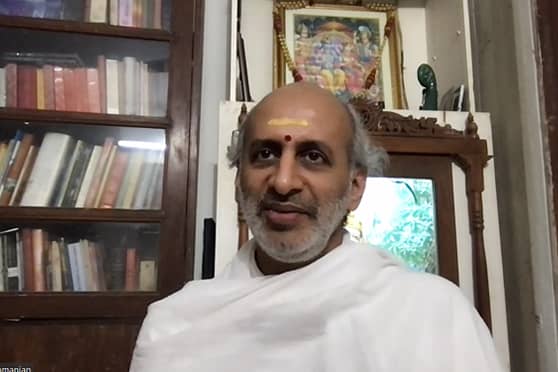Does it make sense to read Sanskrit kavyas? Scholar K Ramasubramanian explains why it does


Sanskrit scholar K Ramasubramanian was invited by the Indian Institute of Technology (IIT) Gandhinagar to deliver an online lecture on ‘Does it make sense to read the Sanskrit kavyas?’ as part of the sixth edition of the Introduction to Indian Knowledge System (IKS 2022) elective course conducted by the institute.
Ramasubramanian is a professor at the Cell for Indian Science and Technology in Sanskrit, Department of Humanities and Social Sciences, IIT Bombay. He is a Fellow of the Indian National Science Academy (FNA) and was conferred with the prestigious Maharshi Badarayan Vyas Samman by the President of India in 2008.
During the online lecture, Ramasubramanian spoke on the importance of Sanskrit texts in dealing with life situations. “The Sanskrit language has produced thousands of remarkable kavyas. We can handle various situations of life brilliantly with the help of the wise lessons that these kavyas impart. The kavya literature of the Indian knowledge systems essentially tries to bring in what is there in the shastras in an appealing way. It surfaces at various points of time, guiding us to maintain the necessary balance and progress in our lives,” he said.
IKS 2022 is based on the theme, ‘Precolonial India’s Treasure House of Literatures’.
In the age of scientific exploration and major technological advancement, youngsters might question the significance of ancient Indian texts. Ramasubramanian reasoned that the answer dwells on the broad classification of the Sanskrit language system into shastra, the theoretical aspects of a discipline, and kavya – according to the Ishavasya Upanishad – an exemplary figure whose work transcends time.
During the talk, Ramasubramanian explained what made philosophers such as Sri Aurobindo and even scientists such as C V Raman plead to study the Sanskrit language. He said that the 14th-century rhetorician Vishvanatha’s Sahitya Darpana grouped kavya into drishya kavya (dramas that can be enacted) and shravya kavya (can be heard but not enacted).
He further explained that 11th century scholar Mammata had mentioned in Kavya Prakasha that people who can compose and employ Sanskrit kavyas under various situations gain fame. They also win over the hearts of kings, gain an abundance of wealth, and transcend to a completely different and beautiful plane. The Sanskrit verses of the Panchatantra stories encourage children to adopt good things and drop bad things.
The professor also read out and explained various Sanskrit verses composed by poets of ancient India like Kalidasa and Bhasa, which provide “alleviation of the affliction of those in distress”. The session closed with a Q&A session.
Subramanian will deliver his next lecture titled ‘The kavya aspect of the Siddhanta-jyotisha’ on February 15. All lectures are being live-streamed on IIT Gandhinagar’s YouTube channel.
The IKS 2022 course is open to students and anyone interested in India’s knowledge systems and cultural heritage. Registrations can be done from the institute’s official website.